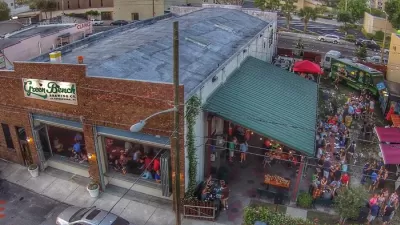In this article from Metropolis, dystopian author and urban critic James Howard Kunstler riffs on localism.
"At the moment, the ideas bundled under the rubric of "localism" are regarded as a lifestyle choice, which is to say a fashion statement of environmental concern, practiced by those with the time and means to follow fashions. 'Locavores'-who make a point to eat locally-are represented overwhelmingly by college-educated, high-income baby boomers who buy those $6 pint baskets of boutique blue potatoes at the farmers' market as much to make a statement of principle (and derive moral comfort from doing so) as to eat nutritionally sound, good-tasting food. Meanwhile, the rest of America keeps driving to the ShopRite for tubes of frozen ground round, jugs of Pepsi, and bags of Cheez Doodles made (grown?) God knows where. So the stylishly fit locavores end up looking like stuck-up moralistic snobs while the majority follows the mindless corporate programming du jour like the overstuffed lumbering TV zombies they have become. By the way, locavores also overwhelmingly drive to the farmers' market (as I have observed in my town), usually in motor vehicles the size of medieval war wagons."
Localism in this sense is very much related to the current craze for styling one's endeavors as "green." Thomas Friedman cheerleads for "green" globalism in his New York Times column while Time magazine runs "GreenCast" programs on its Web site, and all kinds of specialists design green cars, green lightbulbs, green toilets, green campuses, and green corporate headquarters (all the better for hawking those Cheez Doodles). Much of this activity can be described, to borrow a locution from public relations, as blowing green smoke up our own collective ass. Such, alas, is the sorry state of our culture nowadays that just pretending to mean well, for most people and institutions, is good enough."
"A reality-based view of all this suggests that localism and green economic practices will be taken up more broadly and earnestly only when we don't have a choice about it and can no longer manage our bad old ways. My serene personal conviction is that we are much closer to reaching that point than most Americans realize. The romance of climate change currently holds the nation's attention because it's more like a made-for-Hollywood horror-movie plot. Plus, there are a lot of secret side benefits. Will Connecticut become more like South Carolina? Surely some of the denizens of Fairfield County, Connecticut, wouldn't think that was such a bad deal. Will the grain belt move 800 miles farther north, into Canada? Very well then; Canada's our bitch anyway. Will there be more tornadoes in Nebraska? Who cares-God made the place only so movies could be shown on airplanes."
Thanks to Jon Cecil, AICP
FULL STORY: Going Local: When oil becomes scarce, our current way of life will become obsolete

Planetizen Federal Action Tracker
A weekly monitor of how Trump’s orders and actions are impacting planners and planning in America.

Restaurant Patios Were a Pandemic Win — Why Were They so Hard to Keep?
Social distancing requirements and changes in travel patterns prompted cities to pilot new uses for street and sidewalk space. Then it got complicated.

Map: Where Senate Republicans Want to Sell Your Public Lands
For public land advocates, the Senate Republicans’ proposal to sell millions of acres of public land in the West is “the biggest fight of their careers.”

Maui's Vacation Rental Debate Turns Ugly
Verbal attacks, misinformation campaigns and fistfights plague a high-stakes debate to convert thousands of vacation rentals into long-term housing.

San Francisco Suspends Traffic Calming Amidst Record Deaths
Citing “a challenging fiscal landscape,” the city will cease the program on the heels of 42 traffic deaths, including 24 pedestrians.

California Homeless Arrests, Citations Spike After Ruling
An investigation reveals that anti-homeless actions increased up to 500% after Grants Pass v. Johnson — even in cities claiming no policy change.
Urban Design for Planners 1: Software Tools
This six-course series explores essential urban design concepts using open source software and equips planners with the tools they need to participate fully in the urban design process.
Planning for Universal Design
Learn the tools for implementing Universal Design in planning regulations.
Heyer Gruel & Associates PA
JM Goldson LLC
Custer County Colorado
City of Camden Redevelopment Agency
City of Astoria
Transportation Research & Education Center (TREC) at Portland State University
Camden Redevelopment Agency
City of Claremont
Municipality of Princeton (NJ)



























